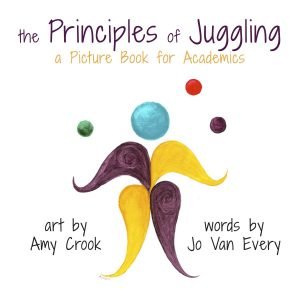Jo VanEvery, Academic Career Guide · How do you think about meetings when you are planning your day/week/month? When you are planning your week (or your day or your month) and you look over what’s already in your calendar what is your reaction to scheduled meetings? When someone contacts you to organize a meeting, how […]
Read More »Planning, or Juggling 101
 My approach to planning focuses on 3 key elements: Priorities, Boundaries, Slack. I have also elaborated these in my book The Principles of Juggling, illustrated by Amy Crook.
My approach to planning focuses on 3 key elements: Priorities, Boundaries, Slack. I have also elaborated these in my book The Principles of Juggling, illustrated by Amy Crook.
If you have come here because you are overwhelmed start with the Emergency Planning Technique. Once you've got things calmed down, you can then consider making a plan to keep things from getting out of control.
Are meetings really a waste of time?
This post was originally written during a time when many universities and workplaces had shifted to remote work in response to the COVID pandemic. Although circumstances have now changed for many people, much of what I say in this post still applies. Jo VanEvery, Academic Career Guide · Are meetings really a waste of time? […]
Read More »Projects vs Workloads
I really need to share this post by Helen Kara with you. She makes some excellent points that fit very well with my approach to planning. And she made me realise something: There is a big difference between project planning and workload planning. What I focus on here most of the time is workload planning, […]
Read More »Emotional labour is real work
This post was originally written during a time when many universities and workplaces had shifted to remote work in response to the COVID pandemic. Although circumstances have now changed for many people, much of what I say in this post still applies. As I watch all the academic Twitter conversations about transitioning to remote teaching […]
Read More »Adjusting to pandemic conditions, part 1
This post was originally written during a time when many universities and workplaces had shifted to remote work in response to the COVID pandemic. Although circumstances have now changed for many people, much of what I say in this post still applies. My business is all about helping academics juggle their work and life responsibilities […]
Read More »Managing email when you’ve rapidly switched to remote working
This post was originally written during a time when many universities and workplaces had shifted to remote work in response to the COVID pandemic. Although circumstances have now changed for many people, much of what I say in this post still applies. Jo VanEvery, Academic Career Guide · Managing email in the rapid switch […]
Read More »Planning for known unknowns
Jo VanEvery, Academic Career Guide · Planning for known unknowns When I write the monthly review newsletter I try to say something specific about that particular month. This is complicated by the international audience for my newsletter. There are different term dates, different holidays, and different weather. I’ve got newsletter subscribers at all stages of […]
Read More »Are you taking breaks?
Fatigue impairs cognitive function. In the planning classes I run in the Academic Writing Studio, I talk about the importance of sleep and rest. I suggest things like taking a break away from your desk to each lunch and/or do some kind of movement activity. I talk about doing stretches or something between activities. […]
Read More »How to feel like you are moving forward
I’ve had a few conversations with clients and colleagues that reminded me that your gremlins might have some very weird rules. “I feel like I’ve been working really hard but I haven’t ticked anything off my to do list.” “I have been working really hard and I have nothing to show for it.” These statements […]
Read More »Prioritising meaningful work when you are feeling overwhelmed and powerless
This is a follow up to the post about being an academic in dystopian times in which I encouraged you to : “Double down on the work that is meaningful to you. What makes your teaching meaningful to you? What makes your research meaningful to you? What makes your writing and publishing meaningful to you? How […]
Read More »Reviewing your writing accomplishments
Anna Clemens and I have been following each other on Twitter for a while. She provides editing and grant writing support for scientists and asked me if I could write something about reviewing the year for her blog. This is what I wrote. Review your scientific writing year (2019) Because her people are mainly scientists, […]
Read More »You are not behind!
When I read Burnout by Emily and Amelia Nagoski, one of the things I noticed was the way that expectations affect stress. I’ve been a fan of low expectations for a long time and there is an entire chapter in that book that summarises the science behind this practice. I encourage you to read (or listen to) […]
Read More »















